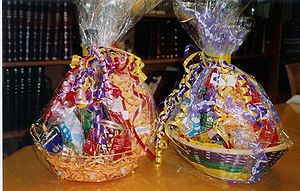
Mishloach manot
Encyclopedia

Purim
Purim is a Jewish holiday that commemorates the deliverance of the Jewish people in the ancient Persian Empire from destruction in the wake of a plot by Haman, a story recorded in the Biblical Book of Esther .Purim is celebrated annually according to the Hebrew calendar on the 14th...
day. The mitzvah
Mitzvah
The primary meaning of the Hebrew word refers to precepts and commandments as commanded by God...
of giving mishloach manot derives from the Book of Esther
Book of Esther
The Book of Esther is a book in the Ketuvim , the third section of the Jewish Tanakh and is part of the Christian Old Testament. The Book of Esther or the Megillah is the basis for the Jewish celebration of Purim...
. It is meant to ensure that everyone has enough food for the Purim feast held later in the day, and to increase love and friendship among Jews as a counter to Haman
Haman (Bible)
Haman is the main antagonist in the Book of Esther, who, according to Old Testament tradition, was a 5th Century BC noble and vizier of the Persian empire under King Ahasuerus, traditionally identified as Artaxerxes II...
's assertion that the Jewish people are characterized by strife and disunity.
According to the halakha
Halakha
Halakha — also transliterated Halocho , or Halacha — is the collective body of Jewish law, including biblical law and later talmudic and rabbinic law, as well as customs and traditions.Judaism classically draws no distinction in its laws between religious and ostensibly non-religious life; Jewish...
, every Jew over the age of Bar and Bat Mitzvah should send a food gift consisting of two different types of food to at least one recipient. The practice is a fairly prominent feature of Purim.
Source
The mitzvah of giving mishloach manot is spelled out in the Book of EstherBook of Esther
The Book of Esther is a book in the Ketuvim , the third section of the Jewish Tanakh and is part of the Christian Old Testament. The Book of Esther or the Megillah is the basis for the Jewish celebration of Purim...
, which enjoins the Jewish people to observe the days of Purim "as days of feasting and gladness, and sending portions of food to one another, and gifts to the poor" (9:22). This verse refers to two different mitzvot: the sending of two different, ready-to-eat foods and/or drinks to one friend (known by the Hebrew term, mishloach manot), and the distribution of two charitable donations (either money or food) to two poor people.
In actual practice, many individuals fulfill the first mitzvah themselves (by sending food gifts to friends, neighbors, relatives, etc.), and the second mitzvah by contributing to charitable organizations which distribute money or food to the poor on Purim day.
Poor people are also required to give mishloach manot. One who cannot afford to buy food for his friend may exchange his own food with that of his friend — this fulfills both their obligations.
This mitzvah may not be fulfilled by giving items other than food. Money or other material items cannot suffice. Only food gifts fulfill this mitzvah.
Laws of giving
The following halakhot apply to the giving of mishloach manot:- Mishloach manot must be sent and delivered during the daylight hours of Purim.
- According to most opinions, the sender and recipient should be observing the same day of Purim.
- For reasons of modesty, according to Orthodox JudaismOrthodox JudaismOrthodox Judaism , is the approach to Judaism which adheres to the traditional interpretation and application of the laws and ethics of the Torah as legislated in the Talmudic texts by the Sanhedrin and subsequently developed and applied by the later authorities known as the Gaonim, Rishonim, and...
, men should send mishloach manot to male friends and females to female friends. A family may send to a man or a woman, and a man or a woman may send to a family. In the same vein, a family may send mishloach manot to another family. Children over the age of six or seven are also encouraged to send mishloach manot to their friends as training for the performance of a mitzvah.
- Mishloach manot are not sent to a mournerBereavement in JudaismBereavement in Judaism is a combination of minhag and mitzvah derived from Judaism's classical Torah and rabbinic texts...
. The mourner himself is obligated to send mishloach manot, but the package should not be too elaborate. According to some opinions, a mourner should send to only one person.
- Mishloach manot can be delivered personally, but it is customary to deliver the food packages via a third party. Children are often involved in this mitzvah as the go-betweens between the giving parties, and are rewarded with candies and treats for their efforts.
- One is not obligated to send mishloach manot as a reciprocal gesture to the sender.
- While the halakha only calls for the giving of two food gifts to one friend, a person who gives mishloach manot to more than one person is called praiseworthy. However, it is better to give more charity on Purim day than to spend more money on elaborate mishloach manot.
Choice of foods

The amount of food in each mishloach manot package should reflect the standards of both the giver and the receiver. A wealthy person should send a nicer package to his recipients than would a poor person. Similarly, one should send a nicer portion to a wealthy person than to a poor person.
The Terumat Hadeshen requires the foods to be fit for use at the festive Purim meal, held later in the day, as this is the purpose of mishloach manot. Some cite the Manot Halevi, who states that the purpose is merely to "increase peace and friendship," as a defense to their sending foods such as candy, pretzels and similar treats to fulfill their requirement. Rabbi Tzvi Pesach Frank
Tzvi Pesach Frank
Rabbi Tzvi Pesach Frank was a renowned halachic scholar and the Chief Rabbi of Jerusalem for several decades.-Biography:...
asserts that the position of the Manot Halevi is not to be taken as a counter to that of the Terumat Hadeshen, but rather in addition to it.
As a fundraiser
The sending of mishloach manot has also evolved into a fundraisingFundraiser
A fundraiser is an event or campaign whose primary purpose is to raise money for a cause. See also: fundraising. A fundraiser can also be an individual or company whose primary job is to raise money for a specific charity or non-profit organization...
device by many Jewish organizations and institutions. Synagogue
Synagogue
A synagogue is a Jewish house of prayer. This use of the Greek term synagogue originates in the Septuagint where it sometimes translates the Hebrew word for assembly, kahal...
s, Jewish schools and youth organizations run "Mishloach Manot Fundraisers" which coordinate the sending of food baskets to their various members, accompanied by a card listing the names of other members who contributed toward the gift. Each member submits a list of the names he wishes to send to, along with a set fee to the organization for each name, thus netting the organization a small profit. In this way, an individual can fulfill his social obligations to many fellow members without having to buy, wrap and deliver the food gift personally.
Other charitable groups collect outright donations and, in return, send the donor cards which he can send to his own recipients. A $10 donor might receive three cards, while a $20 donor receives six, etc. Donors sign and mail the pre-printed cards, which state, "In lieu of mishloach manot, a donation has been made in your name to such-and-such organization." While such a donation does not qualify as fulfillment of the mitzvah of mishloach manot, it is used by many people as a solution to the challenge of having to give food baskets to all the people they know.

